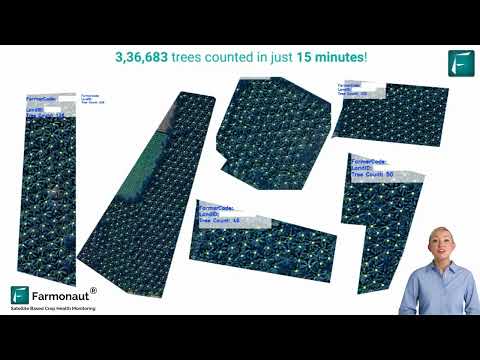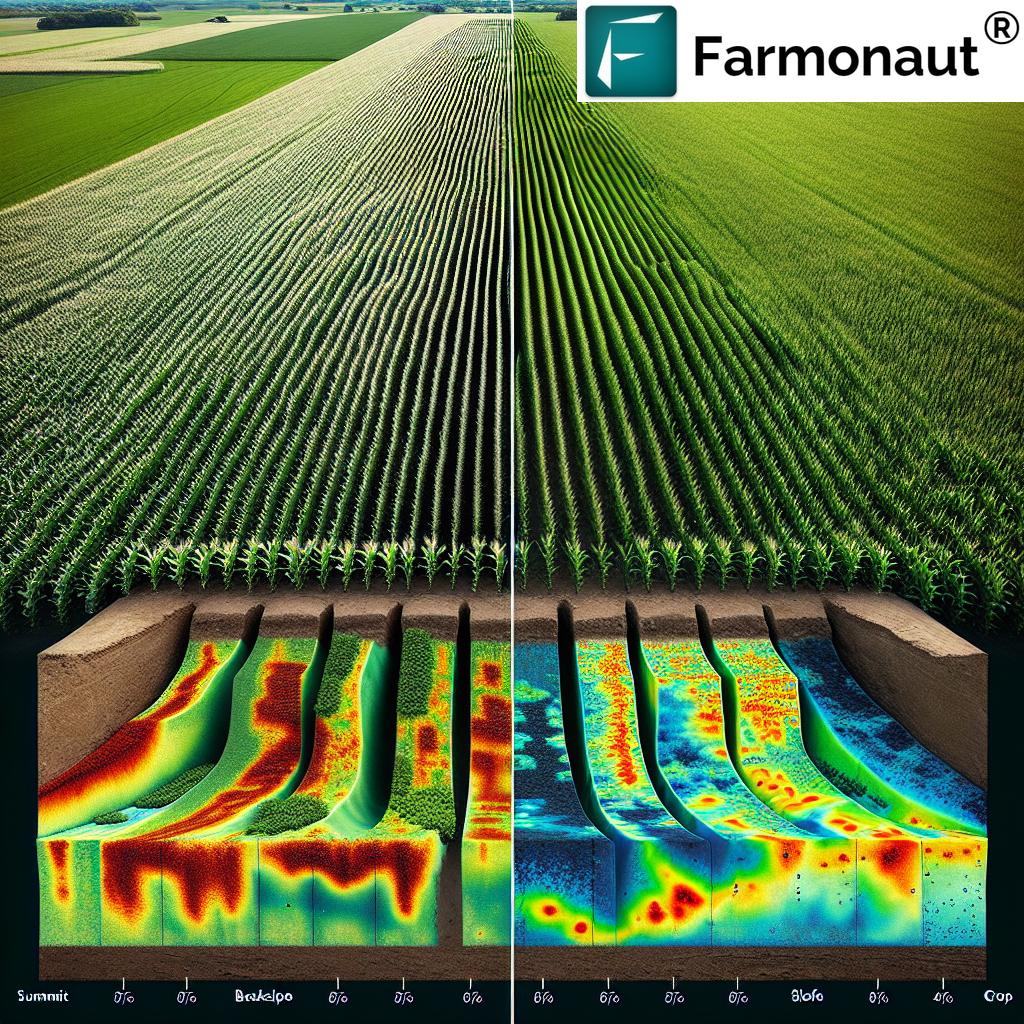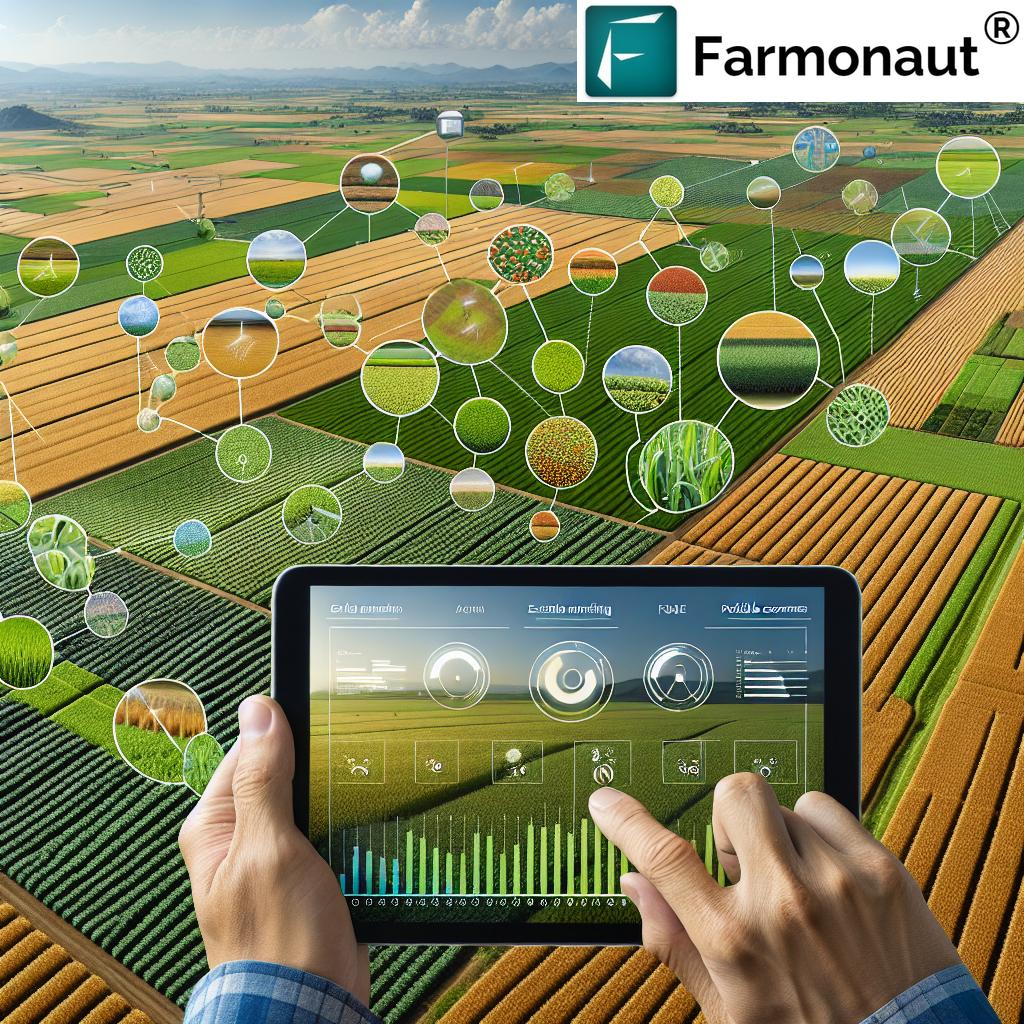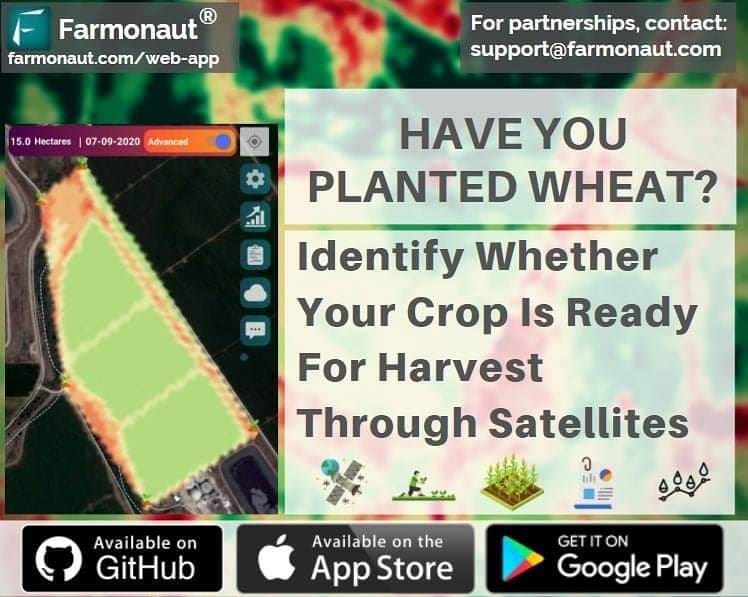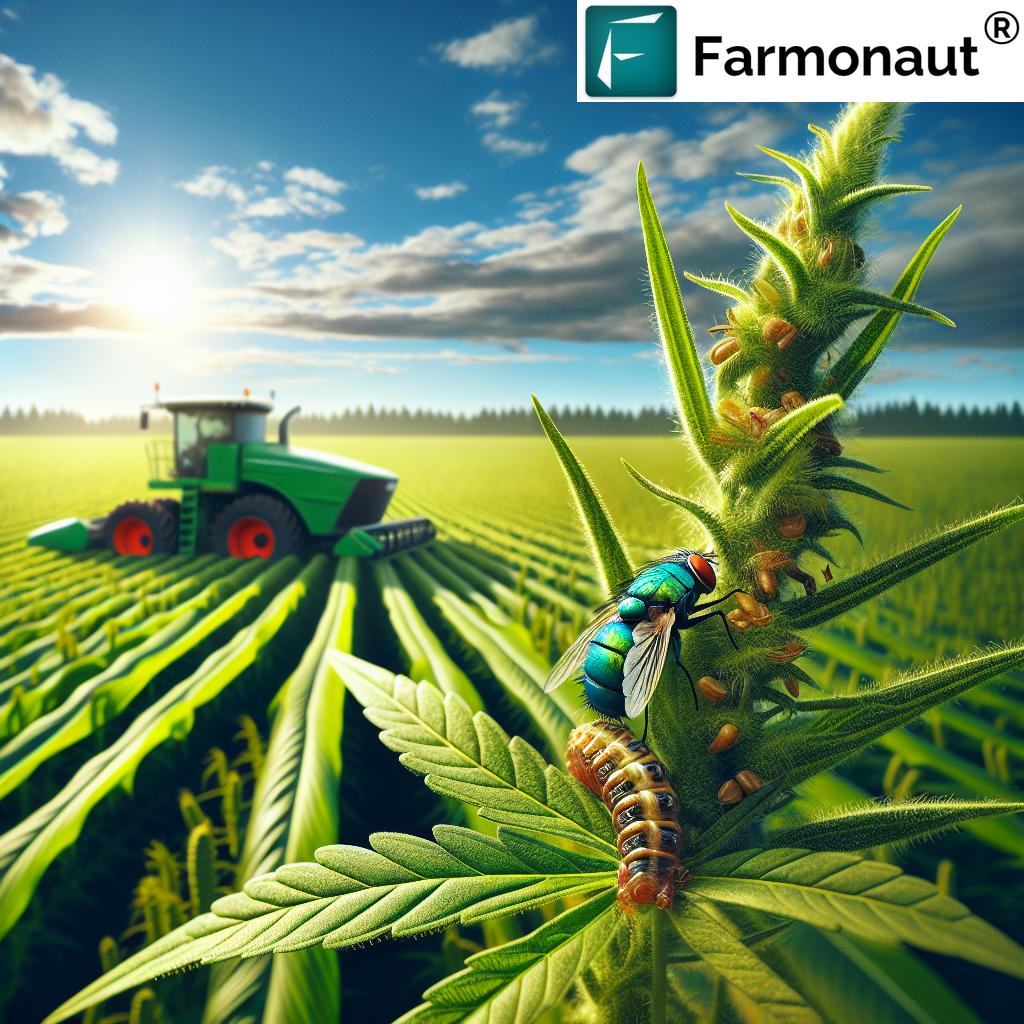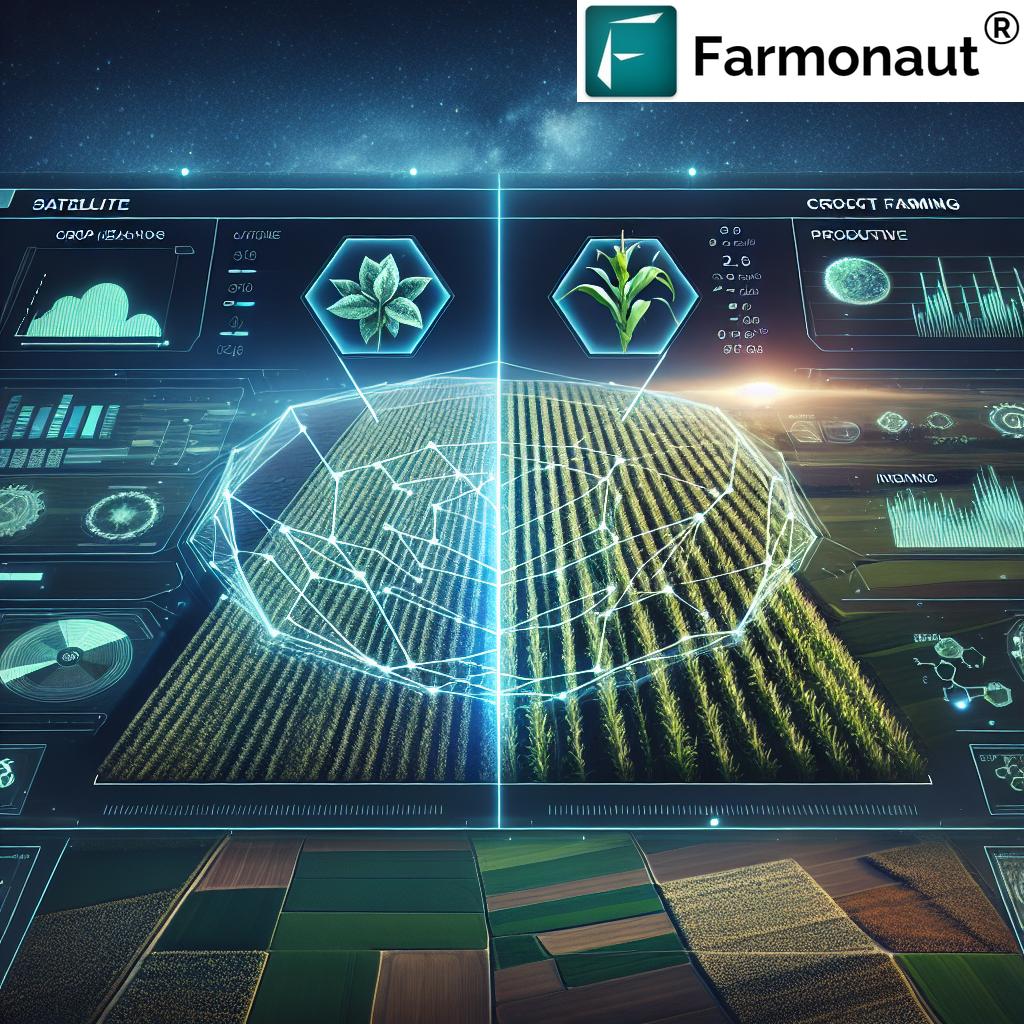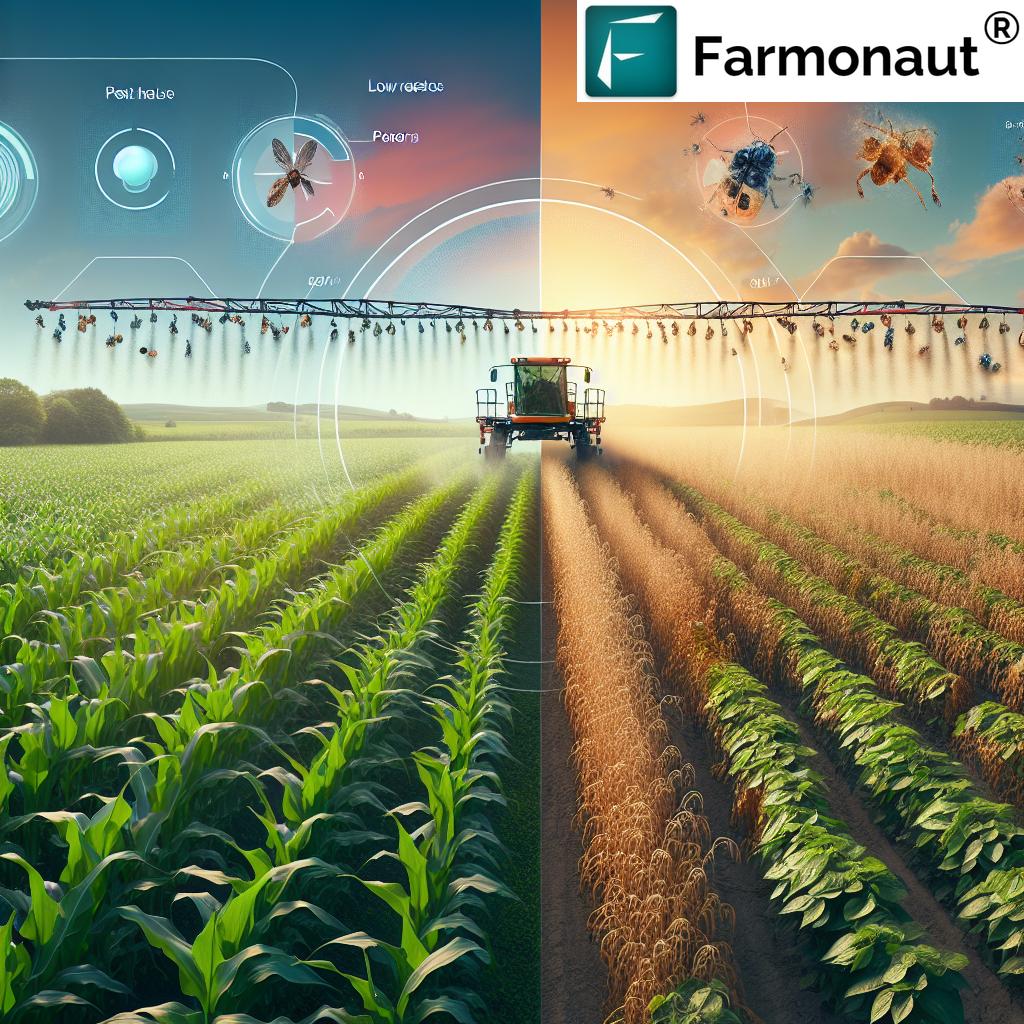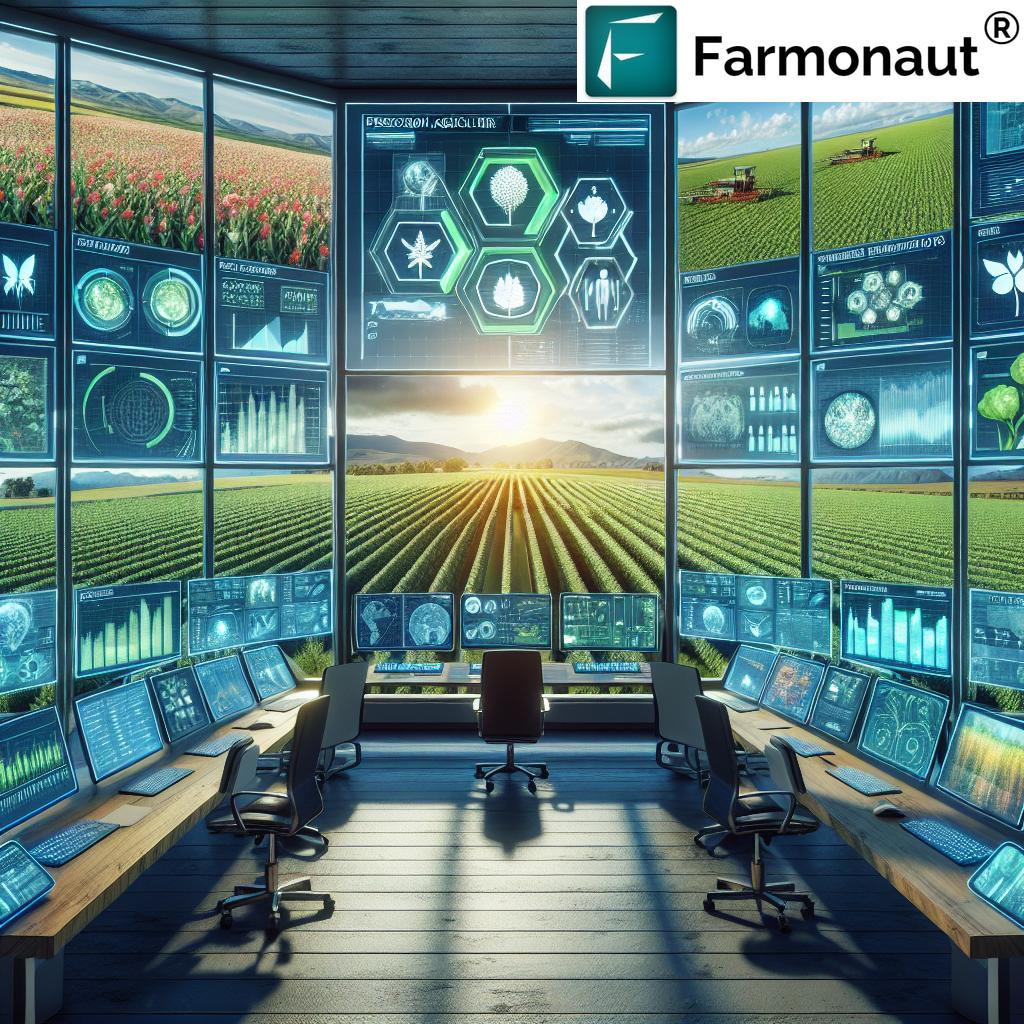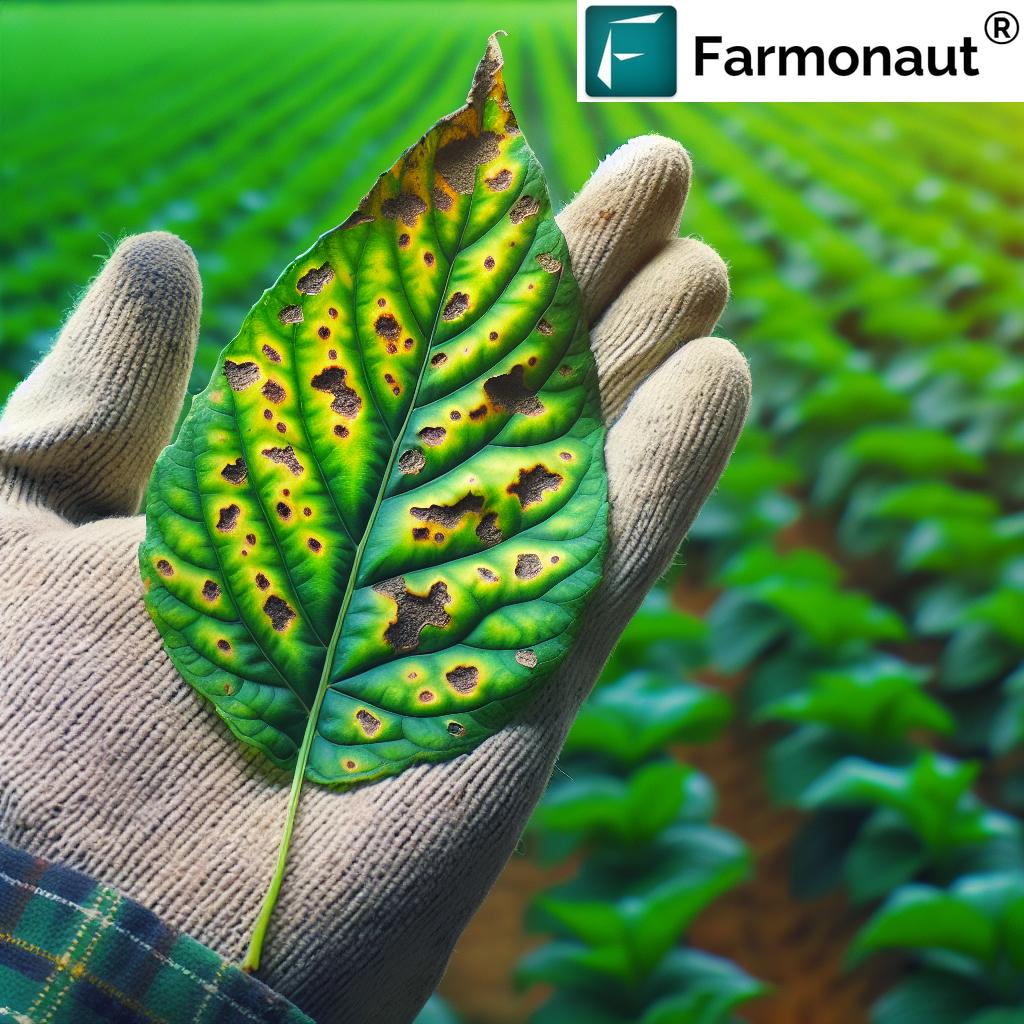Revolutionizing Agriculture: How Farmonaut’s AI-Driven Precision Farming Solutions Boost Crop Yields and Sustainability
“The global agricultural data analytics market is projected to reach $1.4 billion by 2025, driven by AI adoption.”
In the ever-evolving landscape of agriculture, we find ourselves at the cusp of a technological revolution. As representatives of Farmonaut, we are excited to explore how artificial intelligence (AI) is transforming the agricultural sector, offering unprecedented opportunities for data-driven decision-making and precision farming technologies. In this comprehensive blog post, we’ll delve into the world of AI in agriculture, examining its immense potential, current applications, and the challenges that lie ahead.
The Rise of AI in Agriculture
Artificial intelligence has emerged as a game-changer in various industries, and agriculture is no exception. As global food demand continues to rise, farmers and agribusinesses are turning to AI-powered solutions to optimize crop yields, reduce resource waste, and enhance overall productivity. Let’s explore some key areas where AI is making a significant impact:
- Crop Yield Prediction: AI algorithms analyze vast amounts of data, including historical yields, weather patterns, and soil conditions, to provide accurate crop yield predictions.
- Precision Farming: AI-driven precision farming technologies enable farmers to apply inputs like water, fertilizers, and pesticides with pinpoint accuracy, reducing waste and environmental impact.
- Pest and Disease Management: Machine learning models can identify early signs of pest infestations or crop diseases, allowing for timely interventions.
- Smart Irrigation: AI-powered irrigation systems optimize water usage based on real-time soil moisture data and weather forecasts.
- Autonomous Machinery: Self-driving tractors and harvesters equipped with AI can perform tasks with greater efficiency and precision than traditional methods.
At Farmonaut, we’re proud to be at the forefront of this agricultural revolution, offering cutting-edge AI-driven solutions that empower farmers and agribusinesses to make data-informed decisions and optimize their operations.
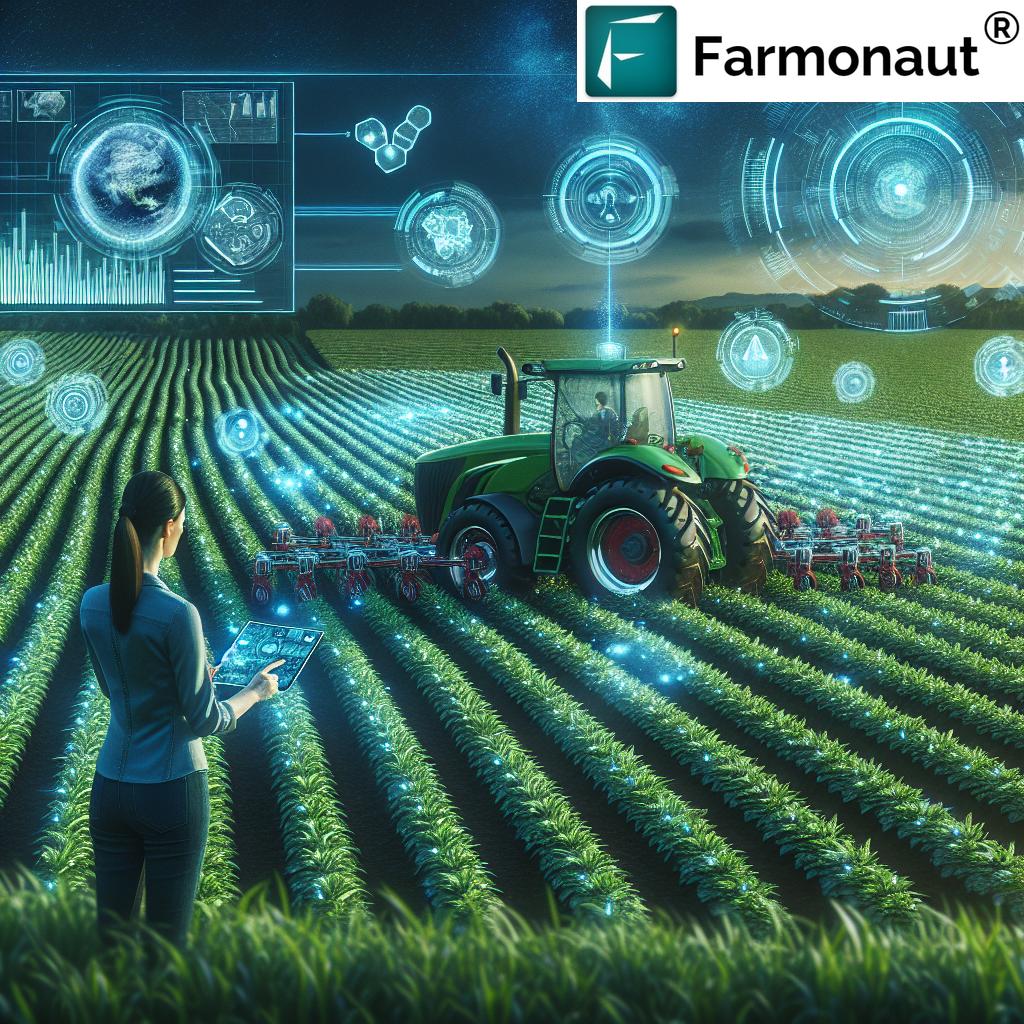
Farmonaut’s AI-Powered Precision Farming Solutions
As pioneers in agtech innovations, we at Farmonaut have developed a suite of AI-driven tools designed to revolutionize farming practices. Our solutions leverage advanced technologies such as satellite imagery, machine learning, and big data analytics to provide farmers with actionable insights and smart farming solutions. Here’s a closer look at some of our key offerings:
- Satellite-Based Crop Health Monitoring: Our platform utilizes multispectral satellite images to monitor crop health, providing real-time insights into vegetation health (NDVI), soil moisture levels, and other critical metrics.
- Jeevn AI Advisory System: This personalized farm advisory tool delivers real-time insights, weather forecasts, and expert crop management strategies, helping farmers make informed decisions to optimize their yields.
- Blockchain-Based Product Traceability: We’ve integrated blockchain technology to ensure transparency and security throughout the agricultural supply chain.
- Fleet and Resource Management: Our AI-powered tools help agribusinesses optimize their logistics and machinery usage, reducing operational costs and improving efficiency.
- Carbon Footprinting: We provide real-time data on emissions, enabling businesses to monitor and reduce their environmental impact.
To learn more about our innovative solutions, visit our web app or download our mobile apps:
The Power of Data-Driven Farming
At the heart of AI in agriculture lies the concept of data-driven farming. By harnessing the power of big data and advanced analytics, farmers can make more informed decisions about every aspect of their operations. Here’s how data-driven farming is transforming the agricultural landscape:
- Optimized Resource Allocation: AI algorithms analyze data from various sources to determine the optimal use of resources such as water, fertilizers, and pesticides.
- Predictive Maintenance: Machine learning models can predict when farm equipment is likely to need maintenance, reducing downtime and repair costs.
- Weather Forecasting: Advanced AI models provide highly accurate local weather predictions, helping farmers plan their activities more effectively.
- Market Trend Analysis: AI-powered systems can analyze market data to help farmers make informed decisions about crop selection and pricing strategies.
- Yield Optimization: By analyzing historical data and current conditions, AI can suggest optimal planting and harvesting times to maximize crop yields.
Through our Farmonaut platform, we’re empowering farmers with these data-driven insights, helping them transition from traditional farming methods to more efficient, sustainable, and profitable practices.
Overcoming Challenges in AI Adoption
While the potential of AI in agriculture is immense, several challenges hinder its widespread adoption. As advocates for technological advancement in farming, we at Farmonaut are committed to addressing these obstacles:
- Data Collection and Quality: Accurate AI models require large amounts of high-quality data. We’re working on streamlining data collection processes and improving data quality to enhance the reliability of our AI-driven insights.
- Privacy Concerns: Farmers may be hesitant to share sensitive data. Our blockchain-based systems ensure data security and privacy, giving farmers control over their information.
- Adoption Costs: The initial investment in AI technologies can be significant. We offer flexible pricing models and scalable solutions to make AI accessible to farmers of all sizes.
- Technical Expertise: Many farmers lack the technical skills to implement and use AI systems. Our user-friendly interfaces and comprehensive support ensure that our solutions are accessible to all users, regardless of their technical background.
- Integration with Existing Systems: Implementing AI often requires integration with existing farm management systems. Our API (Farmonaut API) and developer documentation (API Developer Docs) facilitate seamless integration with various platforms and tools.
“AI-powered smart sprayers can reduce herbicide use by up to 90% while maintaining crop yields.”
The Future of AI in Agriculture
As we look to the future, the role of AI in agriculture is set to expand even further. Here are some exciting developments on the horizon:
- Generative AI for Crop Improvement: AI models could be used to design new crop varieties with desired traits, accelerating the breeding process.
- Advanced IoT Integration: The Internet of Things (IoT) will become more prevalent in farming, with AI processing data from a vast network of sensors to provide even more precise insights.
- Drone Technology: AI-powered drones will play a larger role in crop monitoring, spraying, and even pollination.
- Robotic Farming: We’ll see more advanced robots capable of performing complex farming tasks, from planting to harvesting.
- Predictive Analytics for Climate Change: AI models will help farmers adapt to changing climate conditions by predicting long-term trends and suggesting adaptive strategies.
At Farmonaut, we’re constantly innovating to stay ahead of these trends and provide our users with the most advanced AI-driven farming solutions available.
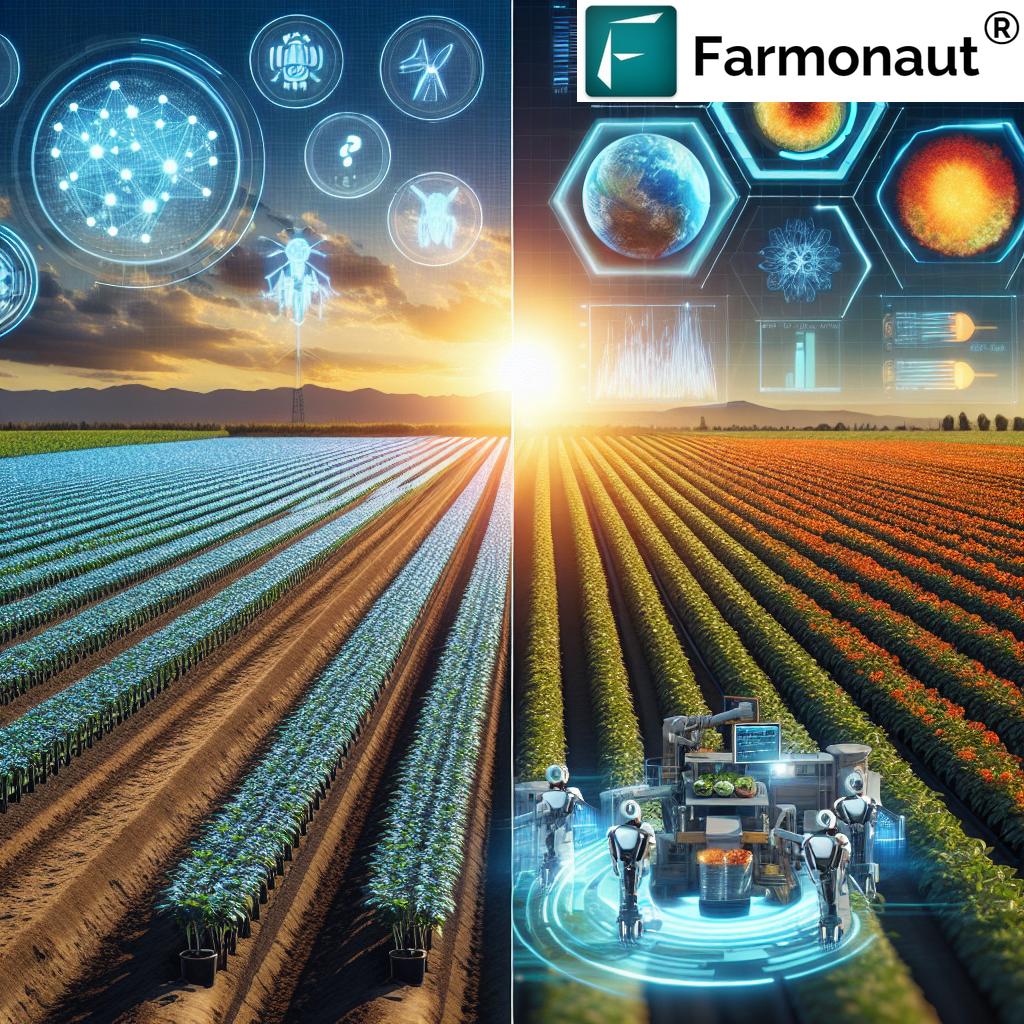
Sustainable Agriculture Practices through AI
One of the most promising aspects of AI in agriculture is its potential to promote sustainable farming practices. As global concerns about climate change and environmental degradation grow, AI-driven solutions offer ways to reduce the environmental impact of agriculture while maintaining or even increasing productivity. Here’s how AI is contributing to sustainable agriculture:
- Precision Resource Management: AI-powered systems optimize the use of water, fertilizers, and pesticides, reducing waste and minimizing environmental impact.
- Soil Health Monitoring: Machine learning models analyze soil data to recommend crop rotations and management practices that maintain soil health and fertility.
- Biodiversity Conservation: AI can help identify areas of high biodiversity value on farms, allowing for targeted conservation efforts.
- Energy Efficiency: Smart farming systems powered by AI can optimize energy use in greenhouses and other agricultural infrastructures.
- Waste Reduction: AI-driven supply chain management can reduce food waste by improving storage, transportation, and distribution processes.
Through our Farmonaut platform, we’re proud to offer tools that support these sustainable practices, helping farmers reduce their environmental footprint while improving their bottom line.
AI Applications in Agriculture: Benefits and Challenges
| AI Application | Key Benefits | Estimated Yield Increase | Implementation Challenges |
|---|---|---|---|
| Crop Yield Prediction | Accurate forecasting, better resource planning | 10-15% | Data quality, model accuracy |
| Smart Sprayers | Reduced herbicide use, cost savings | 5-10% | High initial investment, training required |
| Integrated Pest Management | Early detection, targeted treatment | 15-20% | Complex data integration, continuous monitoring |
| Satellite Imagery Analysis | Large-scale monitoring, timely interventions | 10-20% | Data interpretation, weather-dependent imagery |
| Autonomous Machinery | Increased efficiency, reduced labor costs | 8-12% | High costs, safety concerns, regulatory hurdles |
The Role of Machine Learning in Modern Farming
Machine learning, a subset of AI, plays a crucial role in transforming raw agricultural data into actionable insights. At Farmonaut, we leverage advanced machine learning algorithms to provide farmers with powerful tools for decision-making. Here’s how machine learning is revolutionizing various aspects of farming:
- Image Recognition: Machine learning models can analyze satellite and drone imagery to identify crop types, assess plant health, and detect anomalies.
- Predictive Analytics: By analyzing historical data and current conditions, machine learning algorithms can predict crop yields, pest outbreaks, and optimal harvest times.
- Automated Grading: Machine learning-powered systems can grade crops based on quality, size, and other parameters, streamlining the sorting process.
- Livestock Management: Advanced algorithms can monitor animal behavior, health, and productivity, alerting farmers to potential issues before they become serious.
- Market Analysis: Machine learning models can analyze market trends and consumer preferences to help farmers make informed decisions about crop selection and pricing.
Our Farmonaut platform incorporates these machine learning capabilities to provide farmers with insights that were previously unattainable, helping them make data-driven decisions that boost productivity and profitability.
Satellite Imagery: A Game-Changer in Agriculture
Satellite imagery has emerged as a powerful tool in modern agriculture, providing farmers with a bird’s-eye view of their crops and enabling large-scale monitoring of agricultural lands. At Farmonaut, we’ve harnessed the power of satellite technology to offer farmers unprecedented insights into their fields. Here’s how satellite imagery is transforming agriculture:
- Crop Health Monitoring: Multispectral satellite images can detect variations in crop health across large areas, allowing for early intervention in case of disease or nutrient deficiencies.
- Water Management: Satellite data can help identify areas of water stress, enabling more efficient irrigation practices.
- Yield Estimation: By analyzing satellite imagery over time, we can provide accurate yield estimates well before harvest time.
- Land Use Planning: Satellite data helps in identifying suitable areas for different crops and in monitoring land use changes over time.
- Disaster Assessment: In the event of natural disasters, satellite imagery can quickly assess the extent of crop damage, facilitating faster response and recovery.
Our Farmonaut platform integrates the latest satellite technology with advanced AI algorithms to provide farmers with actionable insights derived from this wealth of data. By leveraging satellite imagery, we’re helping farmers make more informed decisions, optimize their resource use, and ultimately increase their yields sustainably.
The Economic Impact of AI in Agriculture
The adoption of AI in agriculture is not just a technological advancement; it’s an economic revolution. As we at Farmonaut witness firsthand, the integration of AI-driven solutions is reshaping the agricultural economy in several ways:
- Increased Productivity: AI-powered precision farming techniques are helping farmers produce more with less, boosting overall agricultural output.
- Cost Reduction: By optimizing resource use and reducing waste, AI is helping farmers cut costs and improve their profit margins.
- New Job Creation: While AI may automate some tasks, it’s also creating new job opportunities in areas like data analysis, AI system management, and agtech development.
- Market Efficiency: AI-driven market analysis and supply chain management are helping to balance supply and demand, potentially reducing price volatility.
- Investment Opportunities: The growing agtech sector is attracting significant investment, driving innovation and economic growth.
As the agricultural data analytics market continues to expand, we at Farmonaut are committed to developing solutions that not only drive technological advancement but also contribute to economic growth and sustainability in the agricultural sector.
Preparing for the AI-Driven Agricultural Future
As we look ahead, it’s clear that AI will play an increasingly central role in agriculture. At Farmonaut, we believe that preparing for this AI-driven future is crucial for farmers, agribusinesses, and policymakers alike. Here are some key steps to consider:
- Invest in Digital Infrastructure: Reliable internet connectivity and data storage solutions are essential for implementing AI technologies in agriculture.
- Promote Digital Literacy: Training programs to improve farmers’ digital skills will be crucial for the successful adoption of AI tools.
- Encourage Collaboration: Partnerships between tech companies, research institutions, and farmers can accelerate innovation and adoption of AI in agriculture.
- Develop Supportive Policies: Governments should create policies that encourage AI adoption while addressing concerns around data privacy and security.
- Focus on Sustainability: As AI solutions are developed, prioritizing environmental sustainability will be key to ensuring the long-term viability of the agricultural sector.
At Farmonaut, we’re committed to being at the forefront of this agricultural revolution, continuously innovating and adapting our solutions to meet the evolving needs of farmers in the AI era.
Conclusion: Embracing the AI Revolution in Agriculture
As we’ve explored throughout this blog post, artificial intelligence is revolutionizing agriculture, offering unprecedented opportunities for data-driven decision-making and precision farming technologies. From crop yield prediction to sustainable resource management, AI is transforming every aspect of farming, helping to address the global challenges of food security and environmental sustainability.
At Farmonaut, we’re proud to be at the forefront of this agricultural revolution, offering cutting-edge AI-driven solutions that empower farmers and agribusinesses to optimize their operations, increase productivity, and promote sustainable practices. While challenges remain in the widespread adoption of AI in agriculture, we believe that the potential benefits far outweigh the obstacles.
As we look to the future, it’s clear that early adopters of AI in agriculture will lead the industry’s future. By embracing these technologies now, farmers and agribusinesses can position themselves for success in an increasingly competitive and technologically advanced agricultural landscape.
We invite you to join us on this exciting journey towards a smarter, more sustainable future of farming. Explore our Farmonaut platform and discover how our AI-driven solutions can transform your agricultural operations.
Frequently Asked Questions (FAQ)
- What is AI in agriculture?
AI in agriculture refers to the use of artificial intelligence technologies, such as machine learning and computer vision, to optimize farming practices, improve crop yields, and enhance overall agricultural productivity. - How does Farmonaut use AI in its solutions?
Farmonaut leverages AI in various ways, including satellite-based crop health monitoring, personalized farm advisory through our Jeevn AI system, and data-driven insights for resource management and yield optimization. - What are the benefits of using AI in farming?
AI in farming can lead to increased crop yields, reduced resource waste, improved pest and disease management, more accurate weather predictions, and overall more sustainable and profitable farming practices. - Is AI in agriculture only for large farms?
No, AI solutions like those offered by Farmonaut are designed to be scalable and accessible to farms of all sizes, from small family farms to large agricultural operations. - How can farmers get started with AI-driven farming?
Farmers can start by exploring platforms like Farmonaut, which offer user-friendly interfaces and comprehensive support to help integrate AI technologies into their farming practices.






